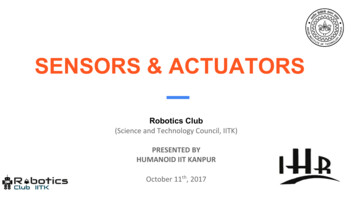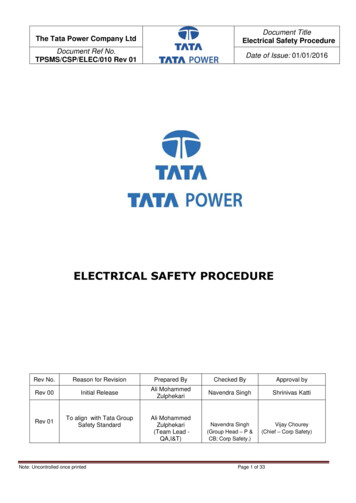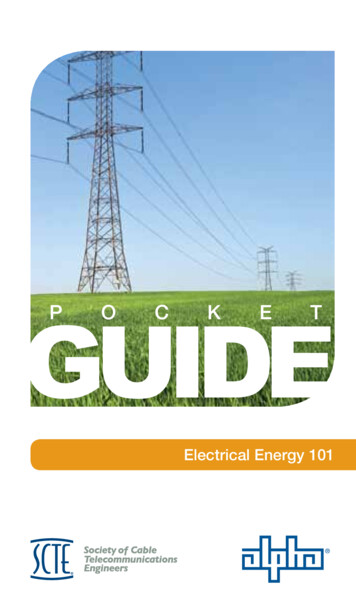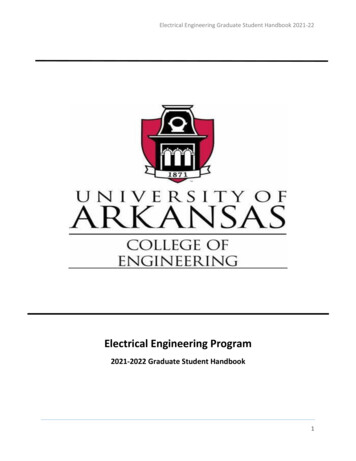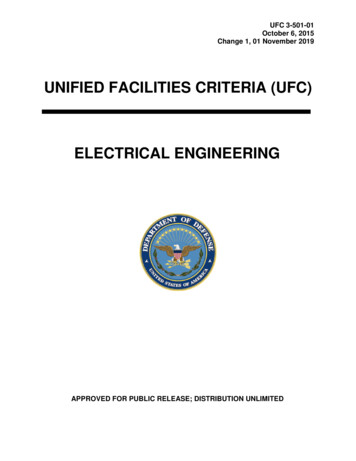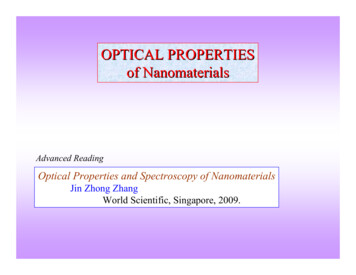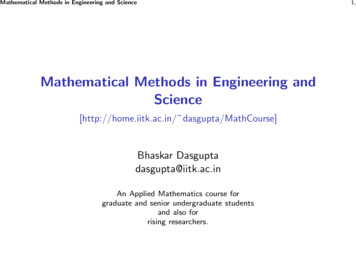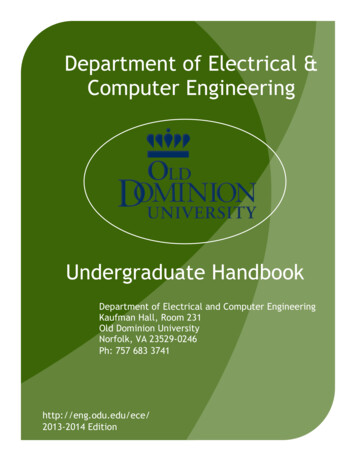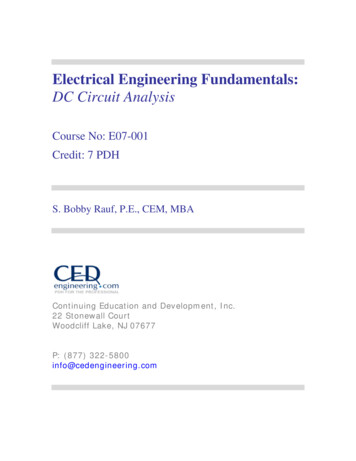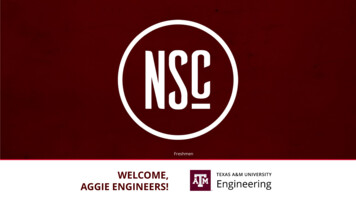
Transcription
ELECTRICALENGINEERINGPOST GRADUATE PROGRAM
ELECTRICAL ENGINEERINGThe Department of Electrical Engineering (www.iitk.ac.in/ee/) offers M.Tech, MS(R),and Ph.D programmes in almost all the sub-disciplines of Electrical Engineering. Theareas include: Digital Communication Systems; Information and Coding Theory;Telecom and Wireless Networks; Peer-to-peer networks; Digital Switching Systems;5G Wireless Communication Systems; Digital Signal and Image Processing; ComputerVision; Inverse Problems and Tomography; Signals and Systems Theory; ControlSystems and Robotics; Networked Control and Electric Vehicle Control; Electronic andVirtual Instrumentation; Fuzzy Logic; Neural Networks and their applications; PowerSystems; HVDC & FACTS, Power Quality; Smart Grid and Synchrophasors; PowerElectronics; Electric Drives; Active Power Filters and Static VAR Systems; RenewableEnergy Interfaces; Microelectronics; VLSI System Design; Analog and Digital CircuitDesign; Semiconductor Device Modeling and Simulation; Solid State Devices; Nanoelectronics and Nano-scale Devices; Organic Electronics; Flexible Electronics;Photovoltaics; Electromagnetics; RF Engineering and Microwaves; Antennas,Metamaterials; MMIC; RF and Microwave Sensors; RFID; Microwave and Mm-waveImaging; RF Energy Harvesting, Electromagnetic and Tomographic Imaging; TerahertzImaging and Testing; Nanophotonics, Plasmonics, Quantum Dot based Devices;Optoelectronics; Signal processing for fiber-optics; Nonlinear fiber optics; Fiber-opticsensors; Quantum Cryptography and Quantum Optics; Spin waves; Photonic Networksand Systems.
POST-GRADUATEPROGRAMMES OFFEREDIn the application form for M.Tech., the applicants must specify their choice of area(s) ofspecialization/code number mentioned above. Please note that the candidates have touse only those code numbers given at the end of this section while filling up applicationform for Ph.D. programme. Eligibility for a specialization may depend on the candidate'schoice of test paper in the GATE examination. For detailed information regardingeligibility and minimum qualifications, applicants should refer to the website of the Deanof Academic Affairs (www.iitk.ac.in/doaa/). Candidates are also advised to refer the EEadmissions webpage (http://www.iitk.ac.in/ee/admissions) for regular updates.M.Tech.: In M.Tech. programme, a student takes eight courses, some of which may becompulsory for the area of specialization chosen, the rest being electives to be chosenin consultation with the programme advisors. The programme also includes aresearch/project component, which culminates in a thesis.MS(R): In MS(R) programme, a student has to complete a minimum of four courses inthe area chosen by the student in consultation with the thesis advisor. After completingthe course work, the student is expected to do research work leading to a thesis. Focuson research makes this program exciting and provides in-depth knowledge to thestudent.Ph.D.: In the Ph.D. programme, a student with M.Tech qualification has to completeminimum of four courses and a student with B.Tech. qualification has to completeminimum of ten courses. The most important part of the doctoral programme is theresearch work leading to a thesis. Student works on exciting research problems to comeup with innovative/original ideas.Specialization in the M.Tech/MS(R)/Ph.D. Programmes is available in any of thefollowing broad areas:Microelectronics and VLSI (Code: 01)Power Engineering (Code: 02)RF and Microwaves (Code: 03)Signal Processing, Communications and Networks (Code: 04)Control and Automation (Code: 05)Photonics (Code: 06)
LABS/FACILITIESThe department has excellent research laboratories and support facilities in severalareas.Micro fabrication lab with basic semiconductor processing capability for silicon as wellas organic material based devices (OLED, organic solar cells, OTFT, etc.); Solar cellcharacterization lab; photo mask making facility; Semiconductor device lab withcapability to synthesize organic materials for organic LEDs and solar cells; Integratedcircuits simulation and VLSI design laboratory with all the modern EDA tools, (e.g.Cadence, Synopsis, Mentor Graphics, Xilinx based gate array design & programmingtools, etc.) and adequate hardware in the form of servers and good number ofworkstations for research and course work with provision to fabricate chips at differenttechnology nodes.Three teaching/training labs have been developed to train students in areas related toorganic electronics. These are the organic electronics processing lab, the organicelectronics characterization lab and the organic electronics simulation lab.Robotics lab equipped with 7 DoF manipulators, mobile robots, and visual systems forautonomous navigation of mobile robots, multi-robot formation and control. Controlsystem lab with facilities for microprocessor-based control of PMDC motors, multimotor coordination, networked control and control of electric vehicles.Distributed Systems and Control (DiSCo) Lab is equipped with quadcopters, fixed wingUAVs, flight simulator, processor-in-loop testing facility for quadcopters, simulation ofmulti-agent systems.Modern high voltage laboratory with AC, DC and impulse test facilities, partial dischargemonitoring, electrometer for polarization and loss factor tests, outdoor insulation testbay; Power electronics and static control laboratory with solid state control of electricdrives; Power systems simulation laboratory equipped with Six Racks Real Time DigitalSimulation (RTDS), Opal-RT and other modern simulation tools; NAMPET laboratorywith complete fabrication and testing facilities for research in power electronicsincluding frequency response analyzer, solar photovoltaic panels. Power managementlab with solar simulator, frequency response analyzer, electronic loads and fabricationfacility.RF and Microwaves lab having network analyzers up to 67 GHz, spectrum analyzers,signal generators, power meters, noise figure meter, shielded anechoic chamber forantenna and RCS measurements, microwave imaging and material testing facility overa wide frequency range, dielectric probe kit, rectangular waveguide and coax calibrationkits for various frequency bands.Fiber optics laboratory equipped with optical spectrum analyzer (600 nm-2000 nm) andinterface development facility for fiber optic links, clean room for semiconductoroptoelectronic device fabrication and photonic measurement laboratory.In addition, Advanced Fiber optics laboratory has WDM optical components,semiconductor optical amplifiers, single-mode standard and nonlinear fibers, Samplingoscilloscope (optical 40 GHz and electrical 65 GHz bandwidth), electronics to enableexperiments on 40-100G optical links.
LABS/FACILITIESNetworks laboratory with scalable and configurable test-bed for simulating complexnetwork topologies, 802.11 WiFi links, software radio, multiservice network and QoS,etc. Wireless Communications laboratory is equipped with NI USRPs platform.Quantum Photonics Research Laboratory is equipped with optical characterizationfacility, comprising of a home-built microscope attached to a high-resolutionspectrometer and a CCD camera, for testing nanophotonic and plasmonic devices, andFDTD simulation tools for designing these devices.Speech processing and multi-modal information processing lab equipped with the stateof art multi-channel audio visual data acquisition test bed along with dedicated data andvoice server connected on E1 digital telephony line enabling research on multi-channeland multi-modal information processing and content delivery; Digital signal processinglaboratory with multiple PCs and DSP hardware based on Texas instrument's DSPs;Communications laboratory equipped with USRPs and WARP boards. Computer visionlab equipped with chroma keying, controlled illumination, structured light sources,various kinds of camera and associated computational resources.Electronic equipment maintenance and calibration facility; Multilayer (up to six layers)PTH printed circuits fabrication facility, including CAD facility for printed circuits designand verification; Department library with a good collection of specialized books,research reports and data catalogues; An extensive campus wide LAN with a highspeed internet connectivity.5G testbed Lab is developed to build the testbed that closely resembles a real-world 5Gdeployment. The testbed will deliver an end-to-end 5G testbed comprising of 5G BS andUE nodes that support enhanced mobile broadband (eMBB), Ultra low latencycommunication (URLLC) and massive MTC including NBIoT services. This testbedcould become a basis for many commercial deployments.The wide-ranging research facilities and various sponsored research activities ensurethat the students are thoroughly exposed to modern trends in Electrical Engineering.The informal atmosphere and free discussions between the students and the teachersare a source of inspiration to both the sides and maintain the standards of academicprogress.
FACULTY LISTŸ Akhtar M J, Ph.D. (Magdeburg): Microwave, mm-wave and THz imaging ive testing, RF Sensors, Artificial dielectrics and metamaterials,Wideband microwave absorbers, Microwave material processing, UWBantennas, Microwave filters, Electromagnetic and multi-physics modelling, RFenergy harvesting, Interaction of electromagnetic waves with biological tissues.Arora V, Ph.D. (IITK): Audio signal processing, machine learning, automaticspeech recognition, music information retrievalBanerjee A, Ph.D. (Notre Dame): Green communications, Cognitive radio, Errorcontrol coding, Wireless communications and Visible light communications.Bansal R K, Ph.D. (Connecticut): Universal source coding algorithms and datacompression; Ergodic theory and large deviation theory – applications; Robustdetection; Sequential detection of a change in distribution.Behera L, Ph.D. (IITD): Intelligent control; Soft computing; Quantum computingand Information; Applied nonlinear controlBiswas A, Ph.D. (IITD): Electromagnetics; Microwave and millimeter wavecircuits and techniques; Optical guide structure and RFICsBudhiraja R, Ph.D. (IITM): Applications of linear algebra, information theory andoptimization to study problems in wireless communications, massive MIMO,cooperative communications, 5G algorithm design, building communicationsystemsChakrabarti S, Ph.D. (Newfoundland): Power system dynamics and stability;Power system state estimation; Synchrophasor applications in power systems;Power system reliability.Chaturvedi A K, Ph.D. (IITK): Communication theory and systems; Mobilecommunications; Spread spectrum systems.Chauhan Y S, Ph.D. (EPFL): Nanoelectronics; Compact modeling ofsemiconductor devices; Low and high frequency electrical characterization;Atomistic Simulation; RF Circuit Design.Chithra, Ph.D. (IITM): Analog and mixed-signal VLSI design, digital VLSI design,frequency and phase synthesis, time-to-digital convertersDas S P, Ph.D. (IITKGP): Power electronics; Electric drives; Electrical machines;Microprocessor and microcontroller systemsDas U, Ph.D. (Michigan): High speed photonic semiconductor devices andintegrated optoelectronics.Dey R, Ph.D. (UT Austin): Topological Insulators, Transition Metal Chalcogenidesand Di-Chalcogenides, Fabrication, Characterization and Analysis of micro andnano devices.Dutta A, Ph.D. (Louisiana State): Semiconductor device modeling; IC fabricationtehnology, Analog/digital/mixed-signal VLSI circuits.Gupta A K, Ph. D. (UT Austin): Wireless Communications, Stochastic Geometryand Numerical Methods.Gupta N, Ph.D. (IISC): High voltage engineering: Dielectrics and electricinsulation; Gaseous and plasma discharge process; Numerical techniques inelectric and magnetic field computation.Gupta S, Ph.D. (UMCP): Nanophotonics; Plasmonics; Quantum optics;Quantum dot based Devices.Harish A R, Ph.D. (IITK): Antennas; RF Engineering; Electromagnetics.
FACULTY LISTŸ Hegde R M, Ph.D. (IITM): Multimedia information processing; Speech ng; Array processing; Application of signal processing in wirelessnetworks.Iyer S S K, Ph.D. (Berkeley): Organic solar cell; semiconductor devices.Jagannatham A K, Ph.D. (UCSD): 5G Wireless Technologies, Massive MIMO,mmWave MIMO, Non-Orthogonal Multiple Access (NOMA), FBMC, IoT and FullDuplex WirelessKarandikar A, Ph.D. (IITK): Quality of Service and Resource Allocation inWired/Wireless Networks, Frugal 5G and Rural Broadband, Resource Allocation,Mobility Management and Dual Connectivity in Heterogeneous WirelessNetwork, Device to Device Communication, Software Defined Networking, TVWhite Space and its Potential for Affordable Broadband Access in IndiaR.S. Ashwin Kumar, Ph.D. (IITM): Analog & mixed-signal integrated circuits andsignal processingMazhari B, Ph.D. (Illinois): Semiconductor device modeling and fabrication; VLSIdesign; Transducers and sensors.Mondal I, Ph.D. (IITM): Analog Integrated Circuit DesignMishra S K, Ph.D. (Florida): Multiphase DC/DC power conversion; Powermanagement circuits; Modeling and control of power electronics systems.Mohapatra A, Ph.D. (IITD): Power system security; Uncertainty modelling;Stochastic analysis and optimization; Robust and efficient system operation andplanning; Renewable integration in power systems; Deregulation.Naik N, Ph.D. (IISC): Reconstruction and analysis approaches to tomographicproblems; Numerical solutions for wave propagation; Sub-surface imaging.Potluri R, Ph.D. (Kentucky): Control system theory; Practical applications ofcontrol theory; Electric vehicles; Networked control systems; Consensus andCooperation.Pradeep Kumar K, Ph.D. (IITM): Signal processing for Optical Communications,Non-linear fiber optics; Quantum cryptography; Fiber-optic sensors, Spin Waves.Rajawat K, Ph.D. (Minnesota): Optimization Algorithms, Network Optimization,Signal Processing in Networks, Online Machine Learning.Rajshekhar G, Ph.D. (EPFL): Biomedical Optics; Light Microscopy; OpticalMetrology; Digital Holography.Sahay S, Ph.D. (IITB): Hardware Platforms for Neuromorphic Computing,Hardware Security Primitives, Novel Device Architectures for Scaling CMOSTechnology, Analytical and Compact Modeling of Semiconductor Devices, Nonvolatile Memories, and Spintronics.Samanta S., Ph.D. (Concordia): Power Electronics, Electric Vehicles, WirelessPower Transfer, Resonant Converters with WBG devices.Sahoo S R, Ph.D. (IITB): Linear and Nonlinear systems, Adaptive Control, Timedelay systems, Control of unmanned vehicles, Multi-agent systems andcoordinated control, AC and DC Microgrids.Sandhan, Tushar, Ph.D. (SNU, Seoul): Computer vision, Machine learning andRoboticsSensarma P, Ph.D (IISc): Power electronic converters; Power quality; FACTSdevices; Renewable energy delivery systems; Motor drives.
FACULTY LISTŸ Sharma A, Ph.D. (IITK): Power Systems, Smart Grid Technology, StateŸŸŸŸŸŸŸŸŸŸŸŸŸŸEstimation, IT Application into Power Systems, Smart City, Multi-Agent Systems,Wide Area Monitoring & Control of Power System, Energy Market, DemandResponse Management, Internet of Things.Sharma G, Ph.D. (USC): Signal processing; Communication Systems; Videosignal processing; Medical image processing.Singh S N, Ph.D. (IITK): Power system restructuring; FACTS technology;Optimal power dispatch and security analysis; Power system dynamics,operation and control; Power quality; Application of genetic algorithms andartificial neural networks in power systems; Wind power.Singh Y N, Ph.D. (IITD): Telecommunication networks; Optical communications;Optical networks; Digital switching systems; Wireless networks; Wireless sensornetworks; P2P networks.Srivastava K V, Ph.D. (IITK): Metamaterials, Microwave Antennas, PrintedAntennas, MIMO Antennas, Microwave Metamaterial Absorbers, MicrowaveCloaking, Finite-Difference Time-Domain (FD-TD) Technique.Swamy S P, Ph.D. (IITM): Wireless Networks, Artificial Intelligence andProbabilistic Graphical Models.Tripathy T, Ph.D. (IITB): Guidance of autonomous vehicles, Formation controlproblems in multi-agent systems, Study of nonholonomic systems, MissileguidanceVasudevan K, Ph.D. (IITM): Communication systems; Signal processing forcommunications.Venkatesh K S, Ph.D. (IITK): Signal/Systems theory, Image and videoprocessing; Computer vision applications.Verma A, Ph.D. (Notre Dame): Epitaxial growth and characterization ofsemiconductor thin films, Semiconductor Device Design and Fabrication,Electron Transport measurements and modelling.Verma, A R, Ph.D. (IISc Bangalore): High Voltage Engineering, Dielectrics andElectrical Insulation, Computational Electrostatics, Polymeric Insulation for HighVoltage Application, Over-voltages in Power SystemsVerma N K, Ph.D. (IITD): Big Data; Internet of Things/Cyber physical systems;Intelligent Data Mining Algorithms and Applications; Diagnosis and Prognosis ofRotating Machines; Soft-Computing in Modelling and Control; Machine LearningAlgorithms; Computer Vision; Bioinformatics; Smart Grid; Intelligent Agents andtheir Applications; Intelligent Informatics; Fuzzy Controllers; Image framegeneration; Brain Computer/Machine Interface.Gururaj Mirle Vishwanath, Ph.D. (IITR): Renewable penetration challenges tothe grid, Machine learning applications to power systems, EV interfacingchallengesBattula, Swathi, Ph.D. (Iowa State University): Electricitymarkets, modelling anddesign of electrical energy systems, energy policyand management.Rituraj, Ph.D. (Stanford): Nanophotonics, optoelectronic devices, quantumoptics and waveguide quantum electrodynamics.
BROAD RESEARCH AREASŸ Digital Communication Systems; Information and Coding Theory; Telecom andŸŸŸŸŸWireless Networks; Peer-to-peer networks; Digital Switching Systems; 5GWireless Communication Systems; Digital Signal and Image Processing;Computer Vision; Inverse Problems and Tomography; Signals and SystemsTheory;Control Systems and Robotics; Networked Control and Electric Vehicle Control;Electronic and Virtual Instrumentation; Fuzzy Logic; Neural Networks and theirapplications;Power Systems; HVDC & FACTS, Power Quality; Smart Grid andSynchrophasors; Power Electronics; Electric Drives; Active Power Filters andStatic VAR Systems; Renewable Energy Interfaces;Microelectronics; VLSI System Design; Analog and Digital Circuit Design;Semiconductor Device Modeling and Simulation; Solid State Devices; Nanoelectronics and Nano-scale Devices; Organic Electronics; Flexible Electronics;Photovoltaics;Electromagnetics; RF Engineering and Microwaves; Antennas, Metamaterials;MMIC; RF and Microwave Sensors; RFID; Microwave and Mm-wave Imaging;RF Energy Harvesting, Electromagnetic and Tomographic Imaging; TerahertzImaging and Testing;Nanophotonics, Plasmonics, Quantum Dot based Devices; Optoelectronics;Signal processing for fiber-optics; Nonlinear fiber optics; Fiber-optic sensors;Quantum Cryptography and Quantum Optics; Spin waves; Photonic Networksand Systems.
ELECTRICALENGINEERING DEPARTMENTCONTACTProf. Soumya Ranjan Sahoo,Email: dpgcee@iitk.ac.in,Phone: 0512-259-6202Ms. Chhavi Srivastava,Email: chhavis@iitk.ac.in,Phone: 0512-259-6670Webpage: https://www.iitk.ac.in/ee/admissions
5G Wireless Communication Systems; Digital Signal and Image Processing; Computer Vision; Inverse Problems and Tomography; Signals and Systems Theory; Control . Microelectronics; VLSI System Design; Analog and Digital Circuit Design; Semiconductor Device Modeling and Simulation; Solid State Devices; Nano- . Modern high voltage laboratory .
